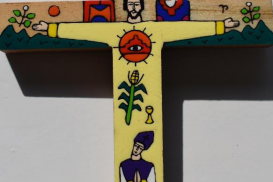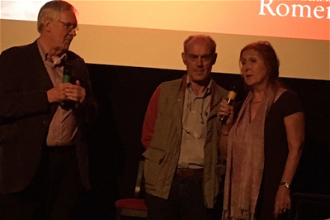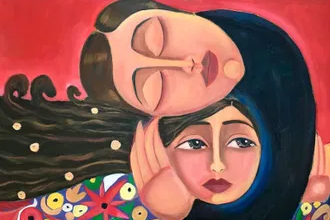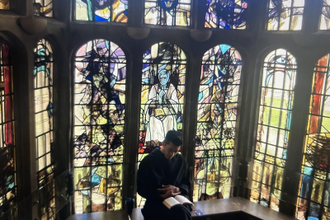Text: Fr Francisco de Roux SJ at London Romero Service
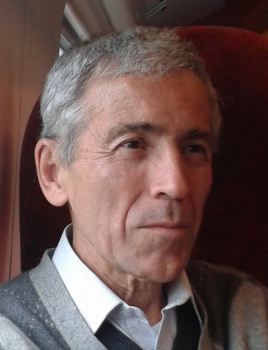
Francisco de Roux SJ
TENSIONS BETWEEN PEACE AND VIOLENCE
This is the text of a talk given at Saturday's ecumenical service at St. Martin in the Fields, Trafalgar Square, to mark the 36th anniversary of the martyrdom of Archbishop Oscar Romero. Jesuit Fr Francisco de Roux has been a leading voice in the efforts to seek a negotiated settlement to Colombia's decades-long armed conflict.
These are the readings that inspire us.
From Matthew 10: 34-39
"Do not think that I have come to bring peace to the earth. I have not come to bring peace, but a sword. For I have come to set a man against his father, and a daughter against her mother, and a daughter-in-law against her mother-in-law. And a person's enemies will be those of his own household.
Whoever loves father or mother more than me is not worthy of me, and whoever loves son or daughter more than me is not worthy of me. And whoever does not take his cross and follow me is not worthy of me. Whoever finds his life will lose it, and whoever loses his life for my sake will find it."
From Archbishop Romero's Third Pastoral Letter of 6 August 1978
We cannot place all our trust in violent methods if we are true Christians or even simply honourable persons. The peace in which we believe is, however, the fruit of justice: opus iustitiae pax. As a simple analysis of our structures shows and as history confirms, violent conflicts will not disappear until their underlying causes disappear. To that extent, as long as the causes of our present distress persist, and as long as the powerful minority persists in its intransigence and refuses to accept even the smallest changes, there will be renewed outbreaks of violence. Further use of repressive violence will unhappily do nothing more than increase the conflict and make less hypothetical and more real the situation in which recourse to force, in legitimate self-defense, can be justified. We therefore regard as a most urgent task the establishment of social justice.
Every individual has the potential for a healthy degree of aggression. It is an endowment by nature to enable persons to overcome the obstacles in their lives. Courage, boldness, and fearlessness in taking risks are notable virtues and values among our people. They have to be built into society, not to put an end to lives but so that law and justice may be achieved for all, and especially for those who today are most cut off from their benefits. The cult of violence, which becomes almost a mystique or religion for some individuals and groups, is doing immeasurable harm to our people. They preach violence as the only way to achieve justice and they propound and practice it as a method to bring justice ... This pathological mentality makes it impossible to check the spiral of violence and it contributes to the extreme polarization of different groups within our society.
Dear friends,
Thank you for inviting me to join you, companions, "compañeros", in the cause of justice and peace.
Let me start by expressing my gratitude and share my spontaneous personal emotions: I have always been deeply touched by the faith, courage and commitment of Oscar Romero, expressed in his mission, as a disciple of Jesus, present in the sufferings and hopes of our people in Latin America. Romero is an inspiration for all of us, everywhere.
Jesus and Oscar Romero challenge us with a paradox. Jesus says: "Do not think that I have come to bring peace to the earth. I have not come to bring peace, but a sword." And this is the same Jesus telling his disciples: "Peace be with you. Love your enemies and pray for those who persecute you. Happy the peacemakers: they shall be called children of God." This is the same Jesus that inspired Saint Francis of Assisi in his prayer: "Make of me an instrument of your peace."
Maybe we can find a meaning in this paradox if we listen to Jesus during his last supper: "If the world hates you, remember that it hated me before you... If they persecuted me, they will persecute you too...and indeed the hour is coming when anyone who kills you, will think he is doing a holy duty for God... Peace, I bequeath to you, my own peace I give to you, a peace the world cannot give, this is my gift to you..."
There is indeed a dramatic dimension in the peace of Jesus. The disciple is invited not to be afraid, because Jesus is alive, because the resurrection is the deepest and profound outcome of the crucifixion. Don't be afraid. But the disciple knows that he himself, as his master, is "destined for the fall and for the rising of many...destined to be a sign that is rejected".
Archbishop Romero was rejected by the oligarchy, the military and even his fellow bishops in El Salvador. He was also a sign of contradiction for the guerrillas and the extreme left wing organizations.
Following the same peace of Jesus, as many of you have done, we have been a sign of contradiction in Colombia. Our path was and is maybe not as relevant and significant as Romero's path, we have been lacking courage or consistency sometimes. But still: we have been a rejected sign. Because our commitment with the peace of Jesus.
We faced radical opposition when we were working in the Magdalena Region for fourteen years, with the poor ones, the excluded and the victims. Several times we were considered suspicious, dangerous, and unacceptable whether for the paramilitaries, the military, the guerrillas or the local governments.
The guerrillas captured us and had decided to execute us during a trial, and we received many death threats from the paramilitaries. As so many others, we understood that Jesus' peace goes together with unavoidable opposition and violence.
Our purpose was to accompany the regional communities in a program of development and peace in the middle of the conflict, in a territory as big as Belgium. We received the support of the European Union, CAFOD and Christian Aid in the United Kingdom. But the paramilitaries assassinated twenty four persons of our team, and the guerrillas killed three of our companions.
I remember the day we found Alma Rosa Jaramillo, a courageous woman of our team, an audacious lawyer, who had come to support the displaced small farmers. First she was kidnapped by the National Liberation Army ELN, and I spent seven days discussing with the guerrillas to get her released. Then she was captured by the paramilitaries. When we managed to recover Alma Rosa, she was lying in the mud, dead; they had cut off her arms and legs, with a chainsaw.
Nevertheless, we kept looking for peace in the Magdalena Medio. Talking with the guerrillas, the paramilitaries and the army. Trying to demonstrate that there was a way to work together, if we took the risk of opening ourselves up to human dignity, present in each and every one of us. The kind of dignity Romero was peacefully fighting for, the dignity we don't get from the government neither from the guerrillas, nor from money, nor from the churches. The kind of dignity we all just carry inside because we are human beings, sharing life and existence in this universe. The dignity we as Christians see as the manifestation of Gods' mystery, the gift of His absolute love in each and every person, in each and every creature, in the world.
And there, in the Magdalena Medio region, when we were surrounded by violent groups, we discovered that there is no safety in weapons. That the only true and sustainable protection comes through trusting people. And that to win trust we have to go through a long process of dialogue and mutual acceptance, and unpredicted individual and social changes, in the midst of uncertainties. With our companions, in the Magdalena Medio, we knew that we were working neither for a salary, economic gain or personal profit; we were putting ourselves at risk, we were giving our lives all of the time, for free, for the dignity of our people, for our own dignity. We obtained results because we loved with total detachment, expecting nothing in return. We understood that "Whoever finds his life will lose it, and whoever loses his life for the sake of Jesus, finds it."
I am certain that because of the generosity of my companions, women and men, and due to the way they devoted themselves to protect life and dignity in extreme difficulties, the Magdalena Medio process became a reference point, in the construction of structural peace, all the way threatened by terrible violence; and the process has been replicated, so that we have nowadays twenty four programs of development and peace in different regions of Colombia.
That was my experience with peace and violence in the Magdalena Medio region.
Today, we write another chapter in my country. Colombia is about to sign a peace agreement between the State and the FARC guerrilla. It is hopefully the end of fifty years of terror and victimization. Half a century of war that caused seven million victims - women, children, teenagers, men - to be displaced from the countryside.
Urban and especially rural communities are desperate and exhausted by the war. Two years ago we organized a meeting with about thirty thousand people coming from conflict zones in the whole of the country. Small farmers, campesinos, native people, afrocolombians. They were the families whose youngsters had joined the guerrilla groups, the paramilitary groups and the army. And all these people stood there asking and claiming: "Stop the war, stop the war now, and stop the war from all sides!"
But peace means division, at least in my country today. Because of political interests: our president campaigned for his election with the slogan "I am the peace and my political opponents are the war". And this slogan split up the country. The former last president, Alvaro Uribe, is leader of the opposition, and he seems not willing to accept a peace agreement if he himself is not the author of it. And there are also economic interests in the prolongation of the war. The military, the cocaine barons, and an important group of the ruling class, see their economic power threatened with the end of the armed confrontation.
We know what Jesus meant when he said: "I have come to set a man against his father, and a daughter against her mother, and a daughter-in-law against her mother-in-law. And a person's enemies will be those of his own household."
I have the sad foreboding that, when in a few weeks we will conclude a peace agreement and a bilateral ceasefire in Havana, Cuba, there will be celebrations in the Vatican and in many countries that have supported our peace negotiations. But that in Colombia we will see fighting in the streets, "men against their fathers, daughters against their mothers", because the war has ended in our territory.
Every day we have to deal with the manipulation of the media, working against the peace process; we see these divisions in families and communities.
But we know that we have to keep going, to continue, to insist, in the struggle for peace and reconciliation; and even if we don't have a Romero, we have the energy and decision of plenty of women and men who are a stand for peace. And this is quite significant, because in the last thirty years we have lost in Colombia about four thousand popular leaders, who were killed because they were working for peace in the middle of contradictions and persecutions.
The reason we have this sad and absurd situation is because of our deep spiritual crisis. For fifty years we have destroyed our human value, with the thousands of kidnappings and massacres, antipersonnel mines, extrajudicial killings, disappearances of people and displacements. And we have guerrillas and paramilitaries, politicians and militaries, trapped by the war, by hatred, by vengeance and mortal retaliations.
In these circumstances, the cult of violence spreads itself, and Romero´s word makes fully sense. The cult of violence, which becomes almost a kind of mysticism or religion, is doing immeasurable harm to our people. The spiral of violence contributes to the extreme polarization of different groups within our society.
Every week I write an article in the largest Colombian newspaper, El Tiempo. And I see the reactions both in the journal and on the web. Some are from supportive friends. But mostly I get threats and attacks from the enemies of the peace process. They call me a terrorist, criminal, kidnapper, guerrillero, son of a bitch, and a danger for the country. But I am not the only one who is threatened in this way. Javier Giraldo, a very consistent and devoted Jesuit companion, suffers every day calumnies and aggression for his courage. And many others, women and men, from different Christian communities, are going through the same painful experience. Thanks God they don't give up. Because we know we don't have an alternative if we are to be consistent with our mission of following Jesus. Because we know you are supporting us with you strength and your prayers.
So in a few weeks we are going to have the signing of the peace agreement in Colombia. This is going to happen, no matter the tensions, discussions and contradictions. But signing the peace agreement is not the most difficult moment. It will be only the beginning of an extremely challenging process of peacebuilding, that obliges us to enter into a complex and demanding transformation in Colombia, if we are to have sustainable peace. These are the challenging changes Romero used to refer to, when talking about "Opus iustitiae pax": only through justice we can build peace. Corruption, inequity, impunity, cocaine production and the destruction of nature by mining and agro industries, are deep-rooted phenomena in Colombia.
And now, hopefully soon to be liberated from the war, we have to stand up for a social and political non-violent struggle for structural changes. I think it will take us at least twenty years of nonviolent process, of social struggle, in a participative society without war to get the structural changes we envision.
Because as Romero says, "As long as the causes of our present distress persist, and as long as the powerful minority persists in its intransigence and refuses to accept even the smallest changes, there will be renewed outbreaks of violence."
We will see a period where empowered communities will stand up for their rights against the intransigence of the powerful rightwing politicians, business people, landowners, maffia barons, paramilitaries and entrepreneurs of devastating mining companies. And we hope to obtain with Romero´s intercession, the strength and the wisdom to persuade the former guerrillas to abandon their weapons forever and to join the people in a long transformation of what used to be the social and political exclusion of afrocolombian, indigenous, and small farmer communities in all of the regions of the country with its huge cultural and ecological richness.
What is at the heart of this discussion is the model; it is the conviction that DEVELOPMENT IS THE PEOPLE. To put it in the negative, DEVELOPMENT IS NOT the millions of tons of palm oil that are extracted, or the tons of sugar cane, or those of bananas for export, or the millions of tons of coal ripped out of the territory. That can be a means for development or a means to destroy human beings.
We people are human beings in an ethnic community, in a campesino community, in a society, in A CULTURE. That is why development is a regional issue. What it's about is the possibility that all of us, men and women, can live without exclusion, in the greatest possible fullness, in harmony with nature in a region, the life that the people wish to live.
Development isn't about going and extracting value from a region; rather, it's about increasing that value and sharing it among all. So you will understand me, the businessmen present here, those who have had the civil courage of listening to the yearnings of the campesinos, of talking and being respected in this collective search: the deal is not about the profits of your companies; the foremost value added that must be sought is not your profits: the deal is the value of the region. This is what Porter and Kramer write in a recent article in the Harvard Business Review about a new form of shared productivity: creating value in a society. And, paradoxically, that is what brings security and sustainability and profit to your companies in the long run.
Let's take a look at our ethical challenge. I'm not going to talk about religious ethics. I'm going to talk about the ethics that we have left here in Colombia when neither political theories, or ideologies, or philosophical explanations, or public morals are of any use at all anymore - the only thing we have left is human dignity.
Dignity is the profound experience that we all share: that we matter as persons, as families, as peoples. The dignity we have seen in women and men in the countryside who refuse to be displaced, to lose their cabildos, to be kidnapped - those who stood unarmed facing those who had the power and the guns. To defend something that they could not give up or they would become worthless as human beings.
You feel it, you know it. We don't owe our human dignity to anyone. We don't owe it to the State or to the Army. We don't owe it to the FARC or to the ELN. We don't owe it to any politician or to any employer who gives us work. Dignity is the same in all of us, is absolute in all of us: we have it simply because we are human beings. And we have it no matter if we are indigenous or black or mestizo or white. And he who has more hectares, or more cows, or arms, even the arms of the State, has no greater dignity than others. All human beings have the same dignity.
What we do with regional development is to establish and enhance the conditions needed so that the ethnic groups, the campesino communities, and the rural peoples, and also caring businessmen, can express their dignity, celebrate their dignity, share their dignity, protect their dignity, live their dignity the way a people wants to live it in a region.
In order to get structural changes, these are some of the most important issues:
The "campesino reserve zones" (zonas de reserva campesina), because there the communities are shielded from the voracity of the market that monopolizes the land in the large holdings (latifundio) and expels the farmers from their fields; there, food is grown efficiently with lesser human and ecological costs and with quality; there is the organization so the campesinos can assert their rights; there, a sense of responsibility toward the environment is ingrained; there, the will for justice prevails. Some fear that the campesino reserve zones will become an instrument for the arrival of the guerrilla when the conflict ends. And I ask myself: What could be better, once the conflict is over, than having territories for food production and for protecting the forests and the rivers, where the former combatants can turn into realities what they dreamt about, such as social justice and participation?
Autonomy for the indigenous ethnic groups and the black and native islanders (Raizales). Turned into regional development, with the life plans and ethno-descendent plans as starting point. With the forms of security that are theirs, which demand previous consultation, voluntary and well-informed, and dialogue, so that any investment in mining or agribusiness is subordinated to the value of life in their regions.
Disappearance of paramilitarism and Bacrims (criminal gangs) from the countryside. Food autonomy to guarantee life in the territories. Protection of vacant lands that are the property of the State. If these should be handed over, it should be to the campesino, indigenous, raizal and ethnic communities. And return to the State the vacant lands that were turned into big holdings and agribusinesses.
Small land holdings for food security, with permanent tropical crops and agroecological farming. They have proved that the small producers, with organization, technology, and credits, with access to markets, can be as productive or more than plantations of products such as rubber or fruit trees, buffalos, cacao or palm oil.
Land ownership for women in the communities. To them, those women who resisted the terror and the silence and who kept the future alive. The return of the young to the countryside, because these days the young are leaving. That they return to the countryside and perform a social service instead of military service, and that they get access to computers and e-mail in the countryside, and that they stay and use the territory productively, with the good education that the regions require. Small mining with the support of the State, combined with the protection of nature and with rights, in legally confirmed licenses.
Do away with cocaine but not with the ancestral coca leaf, in this country that turned into the world's monopoly of the narcotic. Because here, the insurgents, who fought against the multinational companies to defend sovereignty, contributed, together with the coca-producing paramilitaries, to our joining the mafia multinational. The mafia, the multinational most destructive of sovereignty, the promoter of the most perverse capitalist market, where the bullet defines the transactions and sets the prices. That is the reason to eradicate the mafia.
The need to stop fumigations and, instead, a decisive boost to an inclusive regional development, with State subsidies to the excluded small farmer who had to survive by planting coca. The productive redistribution of land so that a major part of the millions of hectares now used for extensive cattle ranching will return to food production. And to redistribute the lands now taken up by unproductive large landholdings.
The coherent presence of entrepreneurs who bring to the countryside capital, technology, innovation, economies of scale, basic infrastructure, and jobs. And they put this entrepreneurial presence, through industry, at the service of regional value, defined as the life wished for and the dignity of the inhabitants of the territory. Safeguarding rights, security, and sustainable and human development in all the regions facing the mining "locomotive".
A shift in the universities, so they go to the rural regions.
Infrastructure for the countryside, secondary and tertiary roads, roads in the veredas, and multi-mode transportation systems.
In all of these concepts, at the core there is always the challenge of regional development with human dignity as starting point. An organic, comprehensive, all-encompassing development that is not the development of sectors but of regions, of people, of nature, having decided to live without excluding anyone.
This same comprehensive development presents us with the responsibility of sitting down, all of us who are involved in a territory. Together, campesinos and ethnic groups, women, fishermen, entrepreneurs and communal authorities, universities, and organizations - to decide, in a participatory way, about the map of the region: which forests are we going to protect, which forests are going to be productive, what rivers and what wetlands are going to be looked after, which lands will be devoted to production for food sovereignty, where are there going to be campesino reserve areas, which areas are going to be devoted to small-scale production of permanent tropical crops, which will be assigned to agro-industry and under what conditions, and where, and with what restrictions, will big mining be acceptable - but always from the perspective of regional development, of the life that the people wish for, in harmony with the environment. In this regional dialogue we will determine whether or not we will be able to live in peace.
The challenge is that we have to build our country in a participative way, in an equitable way, all of us, men and women, together. We want regions where nobody feels they have to leave, where no one will be intimidated, or blackmailed, or persecuted for his or her ideas, or kidnapped, or blown up in pieces by a landmine on his or her plot of land; where the victims are honored and vindicated through the truth and the return to their lands. If we don't, if we can't build this country together, there will be no peaceful future for anyone.
This will only be possible if all of us, men and women, are ready to change. All of us, men and women, must take risks. All of us, men and women, must be able to believe in one another. Once the truth is known, and trust is achieved, we will all have to forgive.
The victims have showed us the way to reconstruction and reconciliation. I had the opportunity to accompany delegations of victims of all sides, women and men, on their visit to La Habana Cuba. There they bore witness of their suffering and expressed their demands to the perpetrators from the FARC guerrillas, the Colombian government as well as the paramilitary.
The victims, with the accounts of their sufferings, allowed us to understand the horrible capacity we have as Colombians broken by the war, to destroy ourselves, to break each other, to humiliate, to spread terror. This was becoming apparent by the testimony of a woman kidnapped during seven years, whose mother was killed by the guerrillas while she herself was imprisoned in the forest. By the case of an indigenous woman whose young daughter and her boyfriend were shot down, after attending a party in town; the two mothers were just allowed to see the dead bodies and the next day the girl and the boy appeared in the newspapers, dressed as guerrilleros and shown as terrorists killed in combat by the army. Or by the case of this woman, a small farmer, who was smashed against her hut by a soldier. She was pregnant, and when hours later she got a sudden hemorrhage, the soldier told a dog to eat the bleeding small fetus of the crying woman.
But these same victims showed us that we Colombians, we are also able to emerge from violence, to liberate ourselves from hatred and revenge, to reconstruct our society, to engage together in a peace process based on justice, to love again, to trust each other, to forgive. And so the women, survivors of several massacres, who had been witnessing the cutting of the throats of their loved ones, brought a candle for their perpetrators, inviting them to overcome the darkness of our drama. And Alan Jara, the governor kidnapped for eight years in several jungle wire prisons, told us that he had come to see his kidnappers, not to ask years of prison for them, but to demand for the end of kidnapping among us. And then there was an Afrocolombian victim, Leider. He described the massacre of La Bojayá, where military left the town to the hands of the paramilitaries. Not much later, the guerrillas attacked the village, and dropped a bomb on the church, killing seventy two people, mostly women and children. And Leider stood up, telling the FARC leader: "You are responsible for this massacre and you have to pay for it." And then, addressing the general of the army, he repeated: "You the military, you are responsible for this massacre, and you should pay for it". And finally he addressed all of them, guerrillas and government, to tell them: "Do you know how you are going to pay for this massacre? You will have to stay here, at the negotiation table, till the day the war is over and we will have peace in Colombia."
Let me finish, after this testimony of our darkness and light by asking you to keep on sustaining us with your prayers. In Colombia as in many places in the world, there are people being confronted with seemingly unavoidable violence and extreme conflict because they, women and men, are a stand for the kind of peace Jesus sends us to proclaim, to sustain, and to build up.
Let's stay together. Thirty years ago, you had the courage and wisdom to support Oscar Romero. Today Romero is asking you, in the name of Jesus, to continue your support for ordinary people, Christians and non-Christians alike, women and men who keep on believing in a fertile, non-violent struggle for peace.
And I join him, asking you to support people in Colombia and everywhere, confronted by persecution, opposition and death.
Please hold all of us in your prayers and help us be a stand for the kind of peace that is based on justice, truth and love.
See also Ellen Teague's report on the service here: www.indcatholicnews.com/news.php?viewStory=29682




